#witches: james i and the english witch hunts
Explore tagged Tumblr posts
Text
Books of 2023 - June
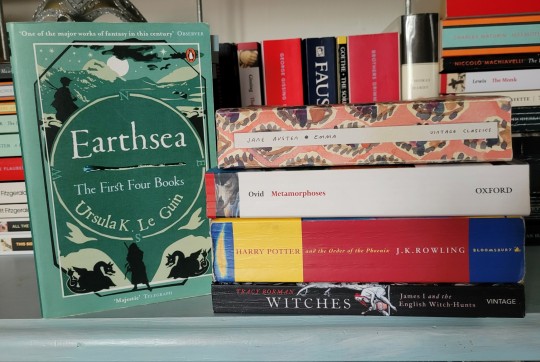
Between finishing my PGCE, still struggling with burnout, and a lack of self restraint with the PS4 I've had a bit of a shit reading month in comparison to my last few months. I did reread Emma though and that's made everything better.
Witches: James I and the English Witch-Hunts by Tracy Borman - I've not been discreet about my disdain for this book. It's full of unsupported speculation and bad faith interpretation of James I/his courtiers. If you want to read some fuller thoughts then read this. And if you are interested in Jacobean/English witches then don't read this book, if you want any recommendations then please ask, but be aware I'm not a specialist in the history of witches.
Harry Potter and the Order of the Phoenix by J.K. Rowling - pretty much the same as last month, I was stressed and needed an audiobook.
Appointment with Death by Agatha Christie - this was fine? Although I completely forgot I'd read this until I checked my reading journal so...take that as you will.
Metamorphoses by Ovid - started off really well for me. I loved Phaethon, enjoyed books 4-7 (I think? That feels right but I'm writing this on the train and away from my journal) a lot! But after this I got bored and was tired of the repetitive nature of the myths. I'm also not a pastoral/nature girl when it comes to books, so the endless amounts of trees, grottos, flowers, and birds started to grate in me.
Emma by Jane Austen - to quote Mr Knightley, "my dearest, most beloved Emma"! I've spoken at length about Emma and my feelings about it are only getting stronger as I reread it. It's my favourite book. It makes me happy. I cannot adequately into words how much I love it and why.
The Farthest Shore by Ursula K. Le Guin - I enjoyed my latest foray into Earthsea a lot, but it wasn't a patch on The Tombs of Atuan. I personally didn't connect with Arren's journey as much as Tenar's and it did effect my enjoyment. It is an excellent book, and I loved seeing Ged's arc come into completion (well, sort of - it FEELS very complete from here so I'm feeling apprehensive about coming back to him in Tehanu, but I have faith in Le Guin) but it wasn't my favourite of the three so far.
Articles on Emma - I'm not listing them all, I don't have the time, but, obviously, it's been a real mixed bag but I've been enjoying myself. It's been fun thinking about Emma in different ways. I'm just going to keep reading them until I've stopped having fun. It's also weird straying out of academic history and into literary criticism 😅
Currently Reading:
Mansfield Park by Jane Austen - and regretting it
Evelina by Frances Burney - loving it!
More articles about Emma!
#books#reading#books of 2023#june wrap up#mini book reviews#bookblr#witches: james i and the english witch hunts#tracy borman#harry potter and the order of the phoenix#appointment with death#agatha christie#metamorphoses#ovid#emma#jane austen#the farthest short#ursula k. le guin#earthsea#classic literature#nonfiction
24 notes
·
View notes
Text






Happy 78th Birthday Scottish actor James Cosmo.
James was born as James Cosmo Copelad at Clydebank on May 24th 1947 and attended Hartfield primary school in Dumbarton.
Cosmo has had a long career dating from 1969, and he continues to be much in demand. A staple of British television, with credits in hundreds of television shows, he made a name for himself portraying tough, uncompromising characters. He appeared in episodes of The Sweeney, The Professionals and Minder in the 1970s, alongside John Thaw, Denis Waterman and Martin Shaw.
He became well known to film audiences however in the 1990s, with important roles in Braveheart, Trainspotting and Emma.
In more recent years he has taken on a number of diverse roles, including in 2005 the part of Father Christmas in The Chronicles of Narnia: The Lion, the Witch and the Wardrobe, an “old one” in the 2007 adaptation of Susan Cooper’s young adult fantasy book The Seeker: The Dark is Rising, voiced the character of HudMaSpecs in the 2008 English language release of Free Jimmy, and in 2009 he appeared in the science fiction short film 2081 which premiered at the Seattle International Film Festival. He has also been in the two Trainspotting films as Mark Renton’s father.
Other shows James has appeared in are the 3 part mini-series Stag and Shetland, and was in ITV’s comedy drama The Durrells.
On international screens we have seen James in some top notch shows, including Sons of Anarchy and Game of Thrones. And on the big screen the Netflix film Outlaw King where he took the role of Robert de Brus, 6th Lord of Annandale, father of The Bruce.
James has also been in the ITV crime drama series The Bay, Tom Clancy's Jack Ryan and on the big screen, the Drama, Breath and the thriller The Kindred.
He shows no signs of slowing down, more recently he appeared in the TV shows Six Four, Nightsleeper and fear, his movies include The Beast Within, The Last Redemption and Saveable. Seven projects are in the offing for the veteran actor.
James is a patron of the charity Chance for Childhood, an award-winning charity working in Africa to support the most vulnerable children. He has also campaigned for LionAid a charity working globally to save lions and end the decline of wild lion populations, he said in an interview "I consider trophy-hunting a crime against humanity."
22 notes
·
View notes
Text
Something I find interesting, and which appears quite often in Old Guard fanfiction, is how people group together Protestants and Catholics in conversation with the witch hunts/trials. (As I go foreward, let us assume Quynh and Andromache were in England when either Protestant rulers Elizabeth I (r. 1558-1601) or James I (r. 1567-1625) reigned.)
The primary targets of the English/Scottish witch hunts were old and impoverished women who lived alone or were widowed. In Essex, 90% of those indicted for witchcraft were women. Some of this stemmed from anti-charity sentiments, other from reform within the Church, some as religious competition in order to prove authority, and some because of a genuine belief in witchcraft and the Devil.
In addition, and especially from members of the elite, anti-Catholic sentiment grew. At this time, Protestants viewed Catholicism and witches as arising from the same source (collusion with the Devil).
"...the witch was regarded not as an isolated magical practitioner, but rather as a member of an anti-Christian sect, a being eager to overturn the moral and physical universe of God, Christian Believer, and Christian ruler alike" (Sharpe, Witchcraft in Early Modern England, 13).
"...although Catholicism was never fully equated with witchcraft, for the English Protestant theologian of the time the two were in many ways closely associated: at the very least, both were seen as dangerous and possibly destructive superstitions" (Sharpe, 15).
I find this interesting because, in several Old Guard fanfictions I have read, there is a lingering animosity between Andromache and Nicolò's religious affiliation. Despite the fact that the Protestant/Catholic split happened around 400 years after Nicolò's birth and death, most people write him to be Catholic. (Also, and this is important, as a priest, he would/does speak Latin.)
In fact, it is most likely Protestants that were responsible for sending Quynh to the bottom of the ocean.
The Latin part is interesting as well, as it comes up in many fanfictions where Nicolò is present or in the frustration and rightful anger that Andromache has about what happened. (Especially since, in the movie, religious motivations are why what happened to the two women happened.)
I found this bit interesting, from a trial in 1556:
"And being required what she did there, she said she did as other women do, and prayed right heartily there, and when she was demanded what prayer she said, she answered, "The Lord's Prayer, the Ave Maria, and the Belief." And then they demanded whether in Latin or in English, and she said, "In Latin." And they demanded when she said it not in English but in Latin, seeing that is was set out by public authority and according to God's word that all men should pray in the English and..." (Anonymous, The Examination and Confession of Certain Witches at Chelmsford in the County of Essex)
From what was said at this trial--and it must be mentioned that this is a transcript and not word for word--we can most likely assume this woman was a Catholic. Therefore, we can assume she was persecuted because she was a) an older woman (with a familiar) and b) a Catholic.
Obviously not everyone is going to know about the differences and longstanding historical animosity between Protestants and Catholics in England, but I thought it was interesting considering how much religion seems to play a role in The Old Guard. I wonder, then, how it would play out with a Catholic and Latin speaking Nicolò in England (either helping Andromache and Yusuf search for Quynh, but also in AUs where he and Yusuf are persecuted instead of Andromache and Quynh).
I'm not at all an expert on this, but I'm taking a class on witchcraft in literature right now and found the fact that Catholics were viewed in the same light as witches. (It is more evident in Spenser's Faerie Queene how much Catholics are hinted at as evil, consorting with the Devil and witches.)
14 notes
·
View notes
Text
British Folklore Book Recommendations
Black Dog Folklore (2015) by Mark Norman: the most comprehensive overview on the market of spectral dog folklore in Britain, albeit fairly hard to get hold of. Recommended for people interested in hellhounds.
Cloven Country: The Devil and the English Landscape (2022) by Jeremy Harte: a survey and analysis of Devil folklore in England (and a bit in Wales). I really can't recommend Harte enough; he's witty, eloquent, insightful and well-read. Recommended for people who want to learn about Devil folklore or just want a good book; this was the book that got me into British folklore in a big way.
Daemonologie (1597) by James Stuart: the standard text on witchcraft and witch-hunting in the English-speaking world. Since there's a lot of Scots, I'd recommend listening to it here, with definitions of the words. Recommended to witch trial nerds and other people trying to understand the mindset of Protestant witch hunters.
Cunning Folk: Life in the Era of Practical Magic (2024) by Tabitha Stanmore: a solid and accessible work on English folk magic between 1350 and 1650. Recommended to people who want a history/sociology of magic.
A Dictionary of Fairies (1976) by Katharine Briggs: this is the standard (and certainly most comprehensive) book on faerie lore in the British Isles. Sadly, it's out of print so unless you have a lot of money or access to a university library (I'm a student; guess which category I'm in) you won't be able to get hold of it. Recommended for people able to get hold of it who want the full scoop on British fairies.
Explore Fairy Traditions (2004) by Jeremy Harte: I've already praised his work on Devil lore, so now I'm praising his work on faeries, which can be found for free online here. Recommended for people who want an overview of faerie lore but don't have access to a university library or an obscene budget for books.
The Secret Commonwealth of Elves, Fauns and Fairies (1692) by Robert Kirk: one of the key collections of Scottish Highland faerie lore, with one hell of a backstory that I will relate to anyone who asks. Can be found online here. Recommended to serious folklore and/or faerie nerds.
The Stations of the Sun: A History of the Ritual Year in Britain (20021) by Ronald Hutton: the standard volume (in both academic and popular circles) on the history of festivals in Britain, with chapters for pretty much every festival of note in Britain detailing its origins and variations throughout time and place. Recommended to people who want to learn more about festivals and to those who want to incorporate some folk tradition into their life.
The Stripping of the Altars: Traditional Religion in England 1300-1540 (1992) by Eamon Duffy: written as a rebuke to then-traditional Protestant histories of the English Reformation, the first half is the standard overview of Late Medieval English Christianity - for the purposes of people reading this, it's got chapters on the liturgical calendar and folk magic, as well as being where I discovered the Lyke-Wake Dirge. The second half, on the English Reformation itself, is substantially worse due to, as mentioned above, the author's conscious anti-Protestant stance leading him to understate support for it at the time. Recommended to people who want to find out about medieval religion and don't mind copious amounts of Middle English
A Treasury of British Folklore: Maypoles, Mandrakes and Mistletoe by Dee Dee Chainey (2018): a really good introduction to/overview of British folklore. Recommended for people starting to learn about it (it's the first book I owned on the topic).
The Watkins Book of English Folktales (2022) by Neil Philip: a giant compendium of folktales from England, collected in the 19th century (the book is the compendium of them) and related in that form. Recommended to people who want to read some stories ("Lazy Jack" is my favourite).
Also, I should note that many of them, particularly my favourite, Cloven Country, were discovered through my local library. Support your local libraries, people.
#british folklore#english folklore#scottish folklore#welsh folklore#folklore#history#book recommendations
13 notes
·
View notes
Text
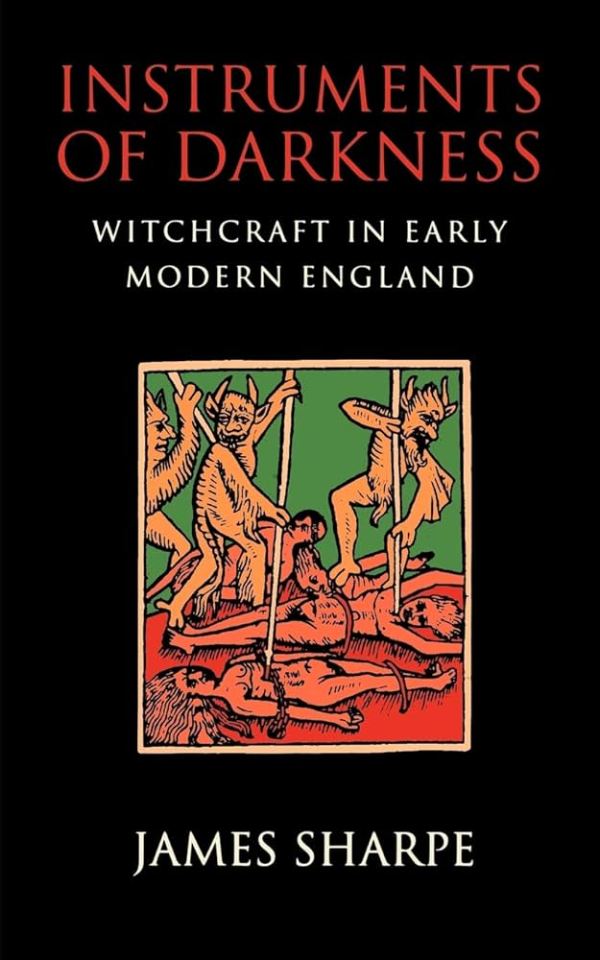
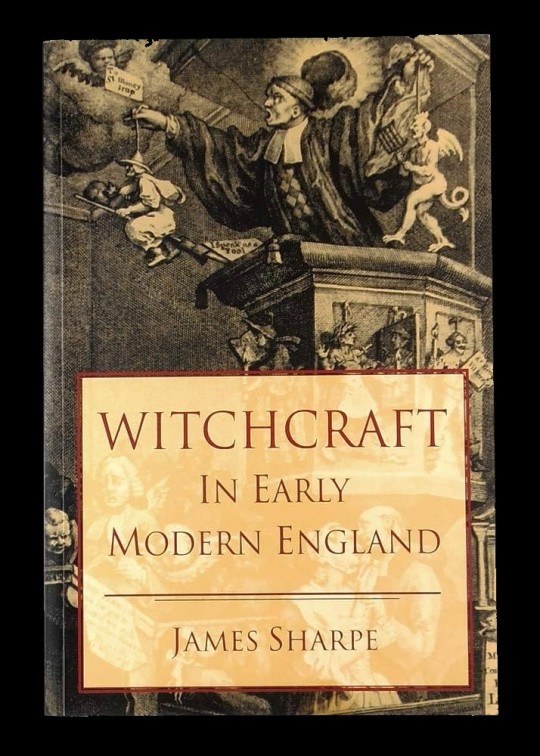
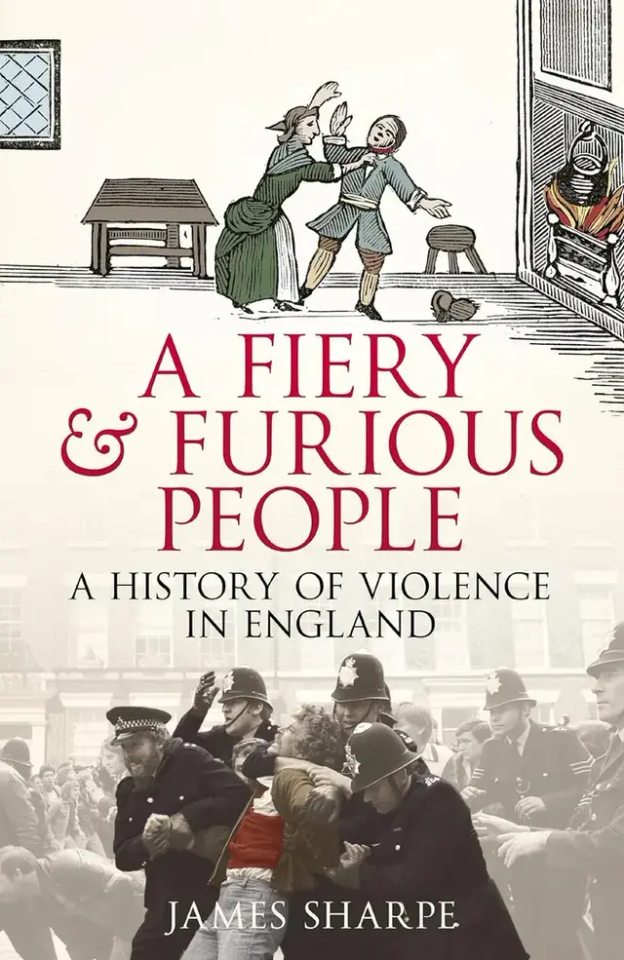
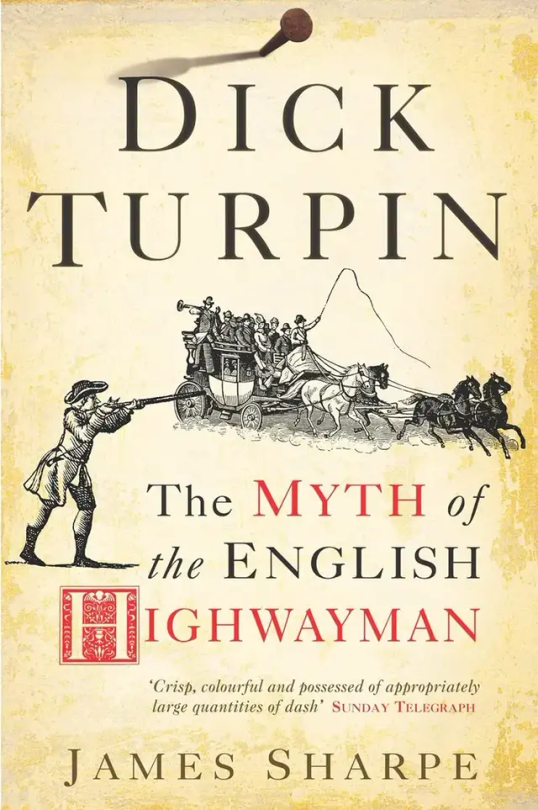
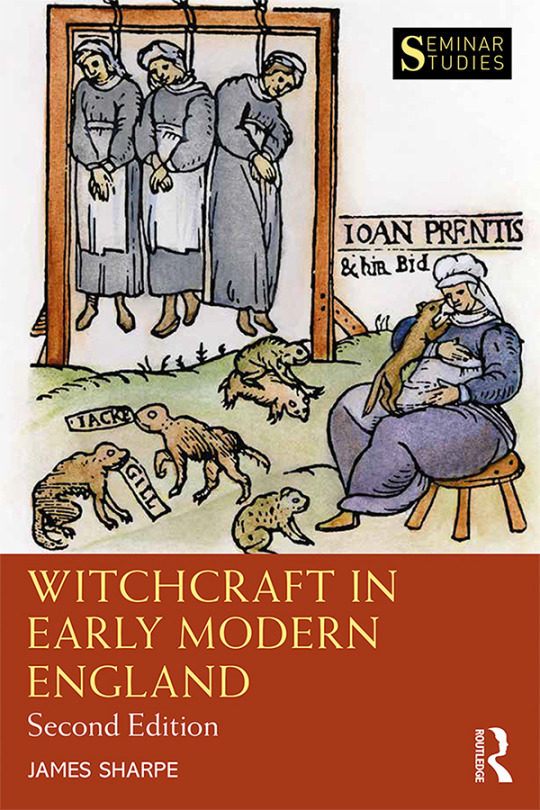
In the mid-1990s the historian James Sharpe, who has died aged 77, wrote Instruments of Darkness, a book on witch-hunting in England that reopened a field of research that had been in the doldrums for a generation after the Welsh historian Keith Thomas’s brilliant Religion and the Decline of Magic (1971). Published in 1996, Jim’s book helped to make the study of British witchcraft what it is today: one of the most lively areas of historical writing.
Earlier historians had argued that whereas witch-hunting on the European continent was fantastical, dominated by beliefs about the devil, English witch-hunting was comparatively rational and down-to-earth, centred on beliefs about the practical harm that witches caused to people and animals. Jim showed that this was nonsense, and that English witch-hunting was also powered by fear of the devil and followed much the same pattern as many other European countries.
An archival hound, Jim surveyed every possible paper-trail in the course of his research, uncovering valuable sources for those who have come after him, including via his copious footnotes and bibliographies. In addition, he went to many conferences on the continent and made it his business to meet the leading scholars of crime and witchcraft, always developing the European dimension of his work.
He loved the detail – he was fascinated, for instance, by the phenomenon of familiars in English witchcraft, creatures who suckled on witches and carried out their bidding, one of the few features that do indeed set English witch-beliefs apart from the continent. He noted them all: Bid the ferret, a lamb, another creature that was carefully kept in a basket with wool, and a white-spotted cat ominously named Sathan.
Perhaps his most appealing book is his history of Anne Gunter, published in 2000, about a 17th-century girl who claimed to be possessed but was unmasked as a fraud. It is a classic of its kind, a marvellous micro-study that reveals the inner world of an unhappy individual who found herself used for other people’s agendas and who, Jim argued, just wanted love and attention. The book, Bewitching of Anne Gunter, explores the mindsets of the doctors, ministers of religion and even the monarch himself, James I, who did not believe Anne’s stories.
As Jim was well aware, at another level it is also a story about fathers – and patriarchal figures of all kinds – who fail their children. It is a gripping read, with lots of humour, and along the way speculates on the origins of football. In the style of a 17th-century broadside Jim gave the book the wonderful sub-title, A Horrible and True Story of Deception, Witchcraft, Murder and the King of England – wording that led the Bavarian State Library in Munich to refuse twice to buy it, on the grounds that it simply could not be an academic book.
Jim followed up with Dick Turpin: the Myth of the English Highwayman (2004), another fantastic read, and then A Fiery and Furious People: a History of Violence in England (2016), which upturned the idea of the peaceable phlegmatic English character.
This was a return to earlier preoccupations, for Jim started out as a historian of crime. From 1983 on he wrote a series of path-breaking books on the history of crime in the British Isles in the 16th and 17th centuries, inspiring others to follow in his wake.
In a field dominated by Tudor and Stuart monarchs and their courts, Jim brought ordinary people into history, in all their variety, by showing just what could be done with court records of crime. These rich sources have revolutionised how we write history because they take us as close as we can to the voices of the lower classes in the past, and Jim was one of the first to realise this.
Jim was born in Lewisham, south-east London, to James, a labourer, and Margaret, a cleaner. At Colfe’s school, in Blackheath, he won a place at Oxford University, where he did a history degree and then a doctorate under Thomas’s supervision. He spent all his career, from 1973, as a history lecturer at the University of York, where he was a marvellous and generous teacher and rose to be professor before retirement in 2016.
York became the go-to place for social history, with the three Jims, Jim Walvin, Jim McMillan and Jim Sharpe, all doing exciting new work on slavery, women’s history and crime respectively. He adored teaching and had a wonderful line in dry humour; his students all knew how proud he was of them.
He is survived by his wife, Krista (nee Cowman), whom he married in 1993, and their children, Guy and Freddie.
🔔 James Anthony Sharpe, historian, born 9 October 1946; died 13 February 2024
Daily inspiration. Discover more photos at Just for Books…?
9 notes
·
View notes
Text
Aislin’s Witch Verse Info — V: Burn Your Village

*Inspired by the portrayal of witches in A.gatha A.ll A.long & my own experiences as a pagan witch, and studies of the historical treatment of “witches”. This is also a more…horror?…genre verse*
CW: Witch trials (Europe & Salem), historical misogyny/bigotry, religion discussion, death, parent disappearance, murder, necromancy,
Aislin is the daughter of the goddess Freyja and the god Tyr, however they’d both taken mortal forms during the time Aislin wa conceived, resulting in Aislin having divine “gifts”, yet not being immortal herself. After her fourth birthday, her parents had to return to their respective homes and left Aislin to be raised by her older sister: Relta McLeod. She was born in 1599, Relta born in 1589.
Aislin and Relta are both “blood witches”: Aislin being able to commune with and raise the dead; and Relta able to heal or cause any pain or ailment she chooses.
Due to Relta’s biological father coming from what would become the United Kingdom, they fled there in hopes of finding relatives to life with. Fortunately, she found an affluent aunt who was able to bring them to the court of the current monarch of England.
However, it was a chaotic time, and a dangerous one for anyone suspected of witchcraft. Relta taught Aislin how to conceal her gifts as to avoid being suspected of heresy or anything otherwise “unchristian”.
Aislin’s soul, or at least part of it that wasn’t “added” by her incarnation’s biological parents, had lived through earlier witch trials and witch hunt. Unfortunately, Aislin has memories of these deaths of hers that she relives via dreams.
Aislin and Relta secretly worship their mother, Freyja, while openly practicing the most “popular” of England’s religions in the early 1600s. Due to the European wars of religion in the 16th and 17th centuries, this caused the girls and their “spinster” aunt to have to move around the future UK frequently to avoid being caught for being the “wrong” type of Christian, or not being “Christian enough”. They passed as Protestant during Queen Elizabeth I’s reign and that of King James VI & I and his successors.
Aislin, reaching eighteen years old, fled to the French court of Louis XIII. She was made a lady-in-waiting to Louis XIII’s wife, and served her faithfully. She also, publicly, converted to the French “popular” religion of Roman Catholicism. She also became good friends with Queen Anne, the two close in age with Aislin a few years older.
She remained in the Bourbon court until she realized she had to use her powers to glamour herself to make it appear she aged. She’d even served as Louis XIV’s English tutor despite being a woman due to Queen Anne’s trust in her when Anne’s son was a child.
Once Louis XIV began to come into his own as king, Aislin left for the French countryside to supposedly “live out the end of her life”. Instead, she did leave for the French countryside, however she worked as a midwife’s apprentice in a small town and eventually became a midwife herself.
In truth, despite neither Relta or Aislin knowing, their “spinster aunt” had actually been The Morrigan looking over them for Lugh.
After the French Revolution…calmed down…Aislin returned to French high society, claiming to be “Lady Aislin Fitzroy”, a descendant of Queen Anne’s beloved servant, “Lady Aislin McLeod”.
She occasionally feigns her death or disappears for a time, returning about every two generations to rejoin high society yet not be recognized by anyone.
In modern times, Aislin is openly a pagan witch and runs an antique story in NY…that also happens to be full of magical items that she has hidden in a sealed back room. She also sells “witchy tools” to those genuinely curious, such as tar.ot decks and selenite sticks.
#Muse: aislin#v: burn your village#witch rp#magic rp#Agatha all along rp#Fantasy rp#Blood tw#fake blood tw#Historical rp#history rp#historical fantasy rp#historical fiction rp
2 notes
·
View notes
Text
The King James Bible: A Flawed Masterpiece

The King James Bible, first published in 1611, is undoubtedly one of the most famous and influential English translations of scripture. Its poetic language has shaped the literary and cultural landscape for centuries, but its reputation as the "best" Bible is not without contention. This translation, while remarkable for its time, carries significant flaws rooted in its political motivations, linguistic challenges, and limited manuscript base.
The translators of the King James Bible worked under strict instructions to align the text with the doctrines of the Church of England. This was not a neutral scholarly endeavor but rather a politically motivated project designed to solidify the Church’s authority and unify England's fractious Protestant groups. As a result, the translation reflects theological biases that may not represent the original intent of the scriptures.
While its language is undeniably beautiful, the Elizabethan English used in the King James Bible is far removed from how we speak today. For many modern readers, this archaic phrasing can obscure the meaning of the text, creating barriers to understanding. Additionally, the translators relied on a limited selection of manuscripts, some of which were later found to be less reliable than older texts that have since been discovered. Modern translations, such as the New Revised Standard Version or the English Standard Version, benefit from these more accurate manuscript collections and offer clearer, more faithful representations of the Bible's original languages.
The Life and Legacy of King James I
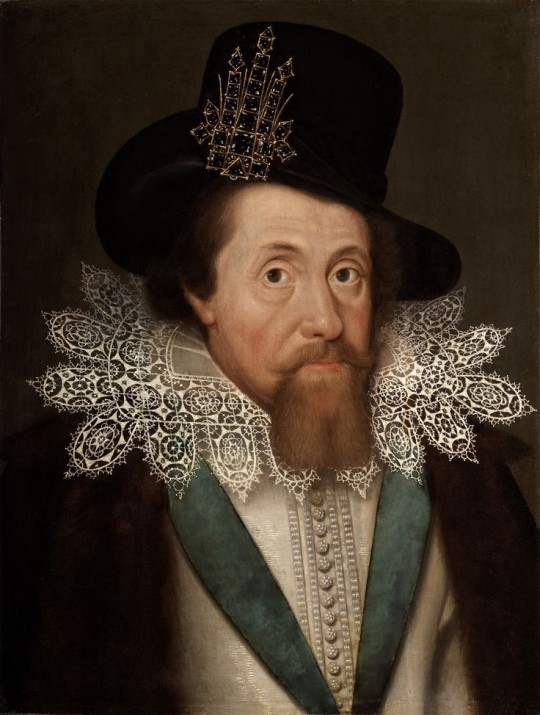
Understanding the King James Bible also requires examining the monarch behind it. King James I of England (and VI of Scotland) ruled during a time of immense religious and political upheaval. While his commissioning of the Bible is often seen as his crowning achievement, his reign was far from exemplary.
James was deeply insecure and obsessed with maintaining control, leading to a reign marked by paranoia and erratic decision-making. He believed in the divine right of kings, asserting that his authority came directly from God and was therefore above human criticism. This belief alienated many of his subjects, particularly Parliament, and set the stage for significant tensions that would later erupt into the English Civil War during the reign of his son, Charles I.
One of James’ most controversial traits was his fixation on witchcraft and the occult. His infamous work, Daemonologie, fueled witch hunts and led to the persecution and execution of countless innocent people accused of practicing witchcraft. This obsession reflected his paranoia and need to control narratives that threatened his authority.
Beyond his political missteps, James' personal life was equally scandalous. He was known for his extravagant spending, which strained the royal treasury, and his close relationships with male favorites, which were often the subject of public gossip. His governance was frequently questioned, and his inability to manage his court effectively created divisions that undermined the stability of his rule.
The King James Bible as a Political Tool
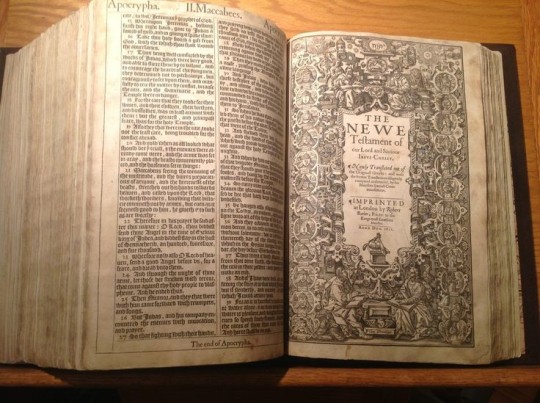
The commissioning of the King James Bible cannot be separated from James’ political ambitions. By unifying England's Protestants under a single Bible, James sought to solidify his authority and prevent further religious discord. The Bible was intended to bolster the Anglican Church’s position against both Catholicism and the more radical Puritan factions.
While the King James Bible succeeded in shaping English-speaking Christianity, it is essential to recognize that its creation was not purely about faith—it was deeply tied to power and control. James understood that religion was a tool to reinforce his claim to divine authority, and the Bible he commissioned became a symbol of that power.
The King James Bible is a work of historical and literary significance, but it is not without its flaws. Its creation was shaped by the political and personal motivations of a deeply controversial king, and its translation reflects the biases and limitations of its time. While it remains a beloved text for many, modern translations provide a more accurate and accessible understanding of the scriptures. King James I’s legacy, both as the architect of this Bible and as a ruler, is a reminder of how power and politics can influence even the most sacred works.
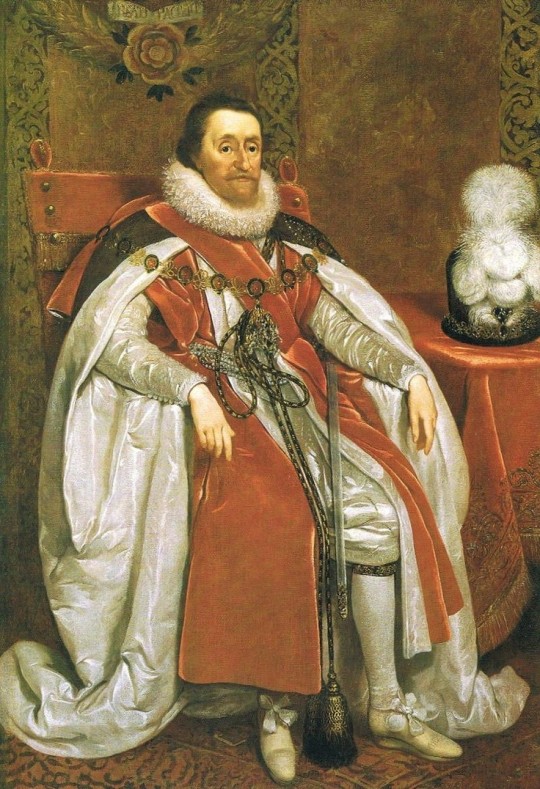
[citations]
Norton, David. The King James Bible: A Short History from Tyndale to Today. 2011.
McGrath, Alister. The Authorized Version of the Bible and the Seventeenth-Century English Church. 1998.
Loades, David. King James VI and I. 2003.
James I. Daemonologie. 1597.
#christian blog#christian faith#religion#christianity#studyblr#religionblr#actually autistic#king james#king james version#christian mysticism#christian history#bible history#bible study
6 notes
·
View notes
Text

[ miles heizer, male, he/him] - was that austin fox i saw arriving into beacon hills today? i hear that they are 19 years old and are a witch. they are known to remind others of dyed hair - something new every few months & tired eyes sparkling in the sunshine. i do wonder what adventures are in store for them? [spirit, 22, est, she/they, n/a]
𝐈 . . . 𝐁𝐀𝐒𝐈𝐂 𝐈𝐍𝐅𝐎𝐑𝐌𝐀𝐓𝐈𝐎𝐍 !
name . . . . austin james fox nicknames . . . . aus, aussie (by his siblings) age . . . . nineteen sexuality . . . . pansexual date of birth . . . . september 4th 1999 place of birth . . . blue ridge, georgia species . . . witch
gender . . . . male pronouns . . . . he/him current location . . . . beacon hills languages . . . . english and some scraps of high school spanish
𝐈𝐈 . . . 𝐏𝐄𝐑𝐒𝐎𝐍𝐀𝐋𝐈𝐓𝐘 !
zodiac . . . .virgo bad habits . . . .being stubborn, bottling up his emotions, workaholic hobbies . . . .art, baking & cooking, camping, exploring, reading, video games fears . . .his newfound abilities, losing those he loves, the unknown (mainly of the supernatural variety) other mentionable details . . . .achievement unlocked! austin has recently discovered he is a witch!
𝐈𝐈𝐈 . . . 𝐀𝐏𝐏𝐄𝐀𝐑𝐀𝐍𝐂𝐄𝐒 !
faceclaim . . . .miles heizer height . . . .5'10 hair colour . . . .brown, but regularly bleached blond and dyed different colors (currently split dyed black and orange for halloween) eye colour . . . .blue scars . . . .numerous small ones from past adventures, longer ones on right arm and left leg from creature encounter
𝐈𝐕 . . . 𝐅𝐀𝐌𝐈𝐋𝐘 𝐈𝐍𝐅𝐎𝐑𝐌𝐀𝐓𝐈𝐎𝐍 !
parents names . . .wyatt fox and london fox (neé kennedy) parents relationship . . . .caring and loving. they are devoted to each other as well as their children, as evidenced by how close the family is siblings names . . . .alexandria (eldest sister), dakota (older sister), dallas (younger brother) pets . . . .ferret named bolin income . . . .a combination of saved up money from odd jobs, inheritance from his grandfather, art commissions and catering services, currently embarking on a steady job hunt residence . . . .currently searching for a permanent residence
𝐕 . . . 𝐁𝐈𝐎𝐆𝐑𝐀𝐏𝐇𝐘 !
Trigger Warnings: Death and near death experiences, major injury
Born in Blue Ridge, Georgia to London and Wyatt Fox, Austin enjoyed a normal life for the most part. He did well in school, helped out around the house with chores, and could usually be found goofing off with his siblings or friends whenever they were free. Unbeknownst to Austin and his siblings, they were technically far from normal. The four of them were members of the latest generation of witches in the Fox family. Magic poured down both family trees, an incredible inheritance that unfortunately painted a rather large target on their backs where hunters were concerned.
(A target that motivated London and Wyatt to keep quiet about their heritage. Only for the time being, they promised themselves and each other. Just until we are safe and the kids are old enough.)
When Austin was eight years old, his grandfather James Fox passed away. The family traveled to Mystic Falls - his parents' hometown - for the funeral and after some discussion, decided to move in order to support Grandma Susan Fox as well as assist her in running the family farm on the outskirts of town.
One small town was traded for another and they moved into the Fox farmhouse. While he was overjoyed to be reunited with his grandma and to have a new wealth of places to explore, the fish out of water feeling was overwhelming at first. The Fox siblings were the new kids, in mostly unfamiliar territory outside of school and the farm.
So, Austin picked up an old habit. Exploration. He'd loved roaming around suburbia and the small town he hailed from, eyes full of wonder. The experiences were practically magical. While the feelings of loneliness remained, he could easily lose himself in learning more about Mystic Falls as well as the surrounding areas.
And then, he met Lucas Thornhill. The two of them swiftly struck up a friendship and stuck to each other like glue. Adventures became a Lucas and Austin thing, treated as something precious like family birthday traditions. Their summers were spent hiking and camping, sharing dreams of getting out of Mystic Falls with each other and the stars.
(As time went on, Austin felt something shift. He still deeply treasured the friendship they had built, the bonds between them strengthened as time went on. But he also couldn't bring himself to deny the presence of something deeper. His gaze would linger just a little longer and he constantly felt like he was on a rollercoaster with how often his heart or his stomach swooped as if they were birds in flight. These feelings and other similar experiences like what his grandma Susie described in her stories about her relationship with his grandpa. He was falling in love with Lucas. Half of Austin was terrified, scared of putting such a special bond in jeopardy. As for the other half? Lost in daydreams of an incredible relationship, a natural extension and progression of how thing were now.)
Then came the night of the attack. It had started like countless others before with the two of them venturing into the woods side by side. As swift as lightning, the creature struck. While Austin did the best he could to fight back, whatever it was focused the brunt of their attack on him. Miraculously, Lucas managed to kill the creature and help arrived.
As the story goes, Austin didn't survive the attack. But the truth is that he woke up to find his grandma Susie at his bedside in the hospital. She was whispering healing spells under her breath and anger practically radiated off of her. She reassured him that 'everything had been taken care of', that he 'didn't need to worry about being led into danger anymore.'
That night, Austin learned about the lie that left his grandmother's lips. She had long been the most vocal critic of the adventures he embarked on albeit for understandable and valid reasons. Danger lurked around so many corners, but as pure as her intentions were - it did nothing to stop the wave of magic that rushed out of her grandson as his emotions took hold. Water poured out of the faucet in the nearby bathroom and a blast of telekinesis scattered the napkins as well as papers outlining his treatment plan. The pillows behind Austin spontaneously exploded in a cloud of cloth and feathers, as if giving a final confirmation of what he was. A witch.
That same night, Susan Fox told Austin and his younger brother Dallas about their magical heritage. Apparently, their older sisters Alexandria and Dakota had been told before they left for college a few years ago. Then came the next reveal of the night - the presence of the supernatural. Not just in Mystic Falls, but in the wider world around them.
Presently, Austin is still reeling from all of this. His parents gifted him a couple of heirloom grimoires in the event he changes his mind about avoiding magic. As it stands, his current stance remains unchanged. Despite the reassurance that the damage from his first blast back during his hospital stay was minuscule, Austin still views these newfound abilities as dangerous and best locked away.
Besides, he has more important things on his mind right now. Namely finding Lucas to tell him the truth...
3 notes
·
View notes
Text
2023 Reading Summary
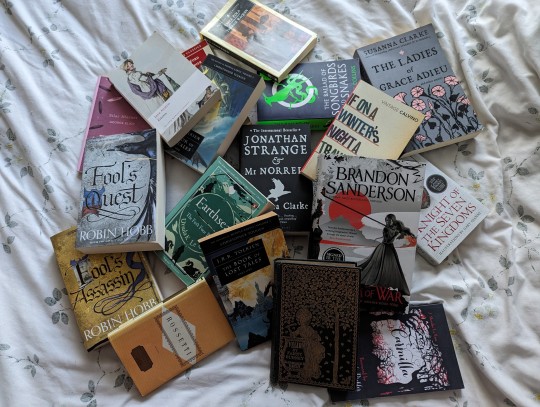
I'm late...again... It's hardly a surprise. However, I've finally looked at my reading for 2023. The only stats I tracked this year was the genre, and even this was a simplified version because I decided I don't care. I spent most of my time this year recording what I thought about the books I read not the data surrounding them. And, if I'm honest, I don't think I'll even bother with the genre in 2024.
The Numbers
In total I read 84 books, which considering I've been working or training full time all year is surprising for me. On average I tend to read 60-70 books in a normal year, usually towards the lower end, so almost 20 books over that is a very pleasant surprise.
The biggest surprise has been my change in most read genre! I've only recorded 4 genres, classic, nonfiction, fantasy, and general fiction, these broke down to:
Classic 53%
Fantasy 31%
Nonfiction 12%
General fiction 4%
Fantasy is usually my top genre with over 50%, so this is a change (I don't think it will be permanent). However the largest shock is the nonfiction! I never read nonfiction for fun, but I guess this is a change from leaving university. I don't have to learn for work anymore, so I'm now looking into these things for fun as the mood takes me. I am disappointed these haven't been history books, however, I'm hoping to change that in 2024 and it has been nice learning more about literature in 2023.
Top Three Books
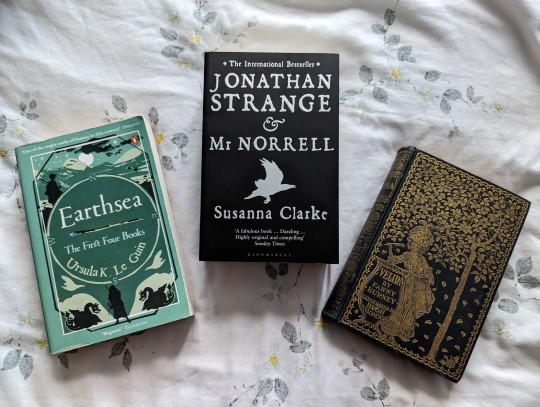
I tried to do a top 5 but the gap between 3 and 4 was too large, so I've narrowed it down to a top 3.
Jonathan Strange & Mr Norrell by Susanna Clarke
The Tombs of Atuan by Ursula K. Le Guin
Evelina by Fanny Burney
I loved all of these books in different ways, and I think I've done a mini review of each in the months I read them. However, if anyone wants detailed thoughts then I'm more than happy to talk about any of these books.
Biggest Surprises
The Ballad of Songbirds and Snakes by Suzanne Collins
Silas Marner by George Eliot
Goblin Market and Other Poems by Christina Rossetti
Fugitive Prince by Janny Wurts
All of these were excellent, they just weren't quite in my top three.
Most Disappointing
Witches: James I and the English Witch-Hunts by Tracy Borman
The Fitz and the Fool Trilogy by Robin Hobb (I DNFed this series after Fool's Quest and I'm heartbroken, but I have major issues with this trilogy in a way I couldn't keep reading as it was destroying my love for Fitz.)
Tress of the Emerald Sea by Brandon Sanderson (this is standing in for all of the secret project books)
Goals (Sort Of...)
To continue the surprises... I've only listened to 4 audiobooks, so most of those books were read physically or through an ebook. This is huge for me as I used to consume about a third of my books through audio, it's a massive improvement because I don't retain them very well. Listening to fewer audiobooks was a big part of my informal (in other words unwritten) reading goals and I'm very happy to have got it down this far. I do think it'll go up again next year because I've got a lengthy commute to work now, but I've also broken the habit of sitting at home listening when I could easily read the book myself and get more out of it.
I did as well with not worrying about numbers or data surrounding the books I'm reading. I deliberately retired my spreadsheet this year and only kept up with my reading journal. After a week or so I didn't miss it in the slightest. I'm not a hard data/stats kind of person, but I am easily persuaded to keep these sorts of records. I started keeping a spreadsheet in 2019 where I track genre, pages, author gender, and format in addition to the book information, by 2022 I was tracking book info, series, genre, format, author info (just too much to list), pages, month read, where I bought the book, if it was a tbr, new or library read, reread or new to me, and rating. It was too much! It was hard work, I was MISERABLE, and I didn't care. It was performing to the standards of what you see in the reading community online... So, I ditched the spreadsheet and I've been much happier. I've read better books because I haven't had my stats in mind, and I've read more. I had more time to actually read because I haven't been spending an inordinate amount of time researching books and entering data into a spreadsheet! I'm definitely making this a permanent change.
I've also used my ereader a lot more this year, I have no numbers to back this up but I've naturally been reaching for it regularly and it has done me good. I've not only read more frequently and for longer periods of time, but I've been more comfortable while reading (no more back, neck, or arm strain from 1000+ page fantasy tomes!) and I've tried books I was hesitant about buying physically because I could access a digital copy. I did have a massive problem with my ereader in November because my Kobo Libra 2 started to have battery changes that nothing resolved and then it died completely. Unfortunately I lost a lot of my reading data, including my notes, which has upset me. But I have saved my elibrary and bought a "new" device (it's a Boox Nova 3) so I can still read - I might discuss getting a Boox separately. However, I am much more cautious about note taking through a device and I'm sticking to recording everything in my physical journal.
This brings me nicely onto my reading journal. I wanted to overhaul my journal this year because my old journal format was growing stale and uninspiring to use. I was often leaving it for weeks at a time and often scrambling to write up 5 or 6 books in one go because I'd forgotten to do it as I was reading. So, I worked through several different styles of journal and found a new, more flexible, and engaging style that can fit my changing moods throughout the year. I'm definitely going to discuss this at a later date, so I won't say much here. But I am very happy to have a new journal system and I'm excited to get into it properly this year.
#books#reading#books of 2023#reading summary#end of year reflection#bookblr#booklr#best of 2023#worst of 2023#reading goals#reading journal
11 notes
·
View notes
Text


On January 20th Alister MacGregor, Laird of Glenstrae was hung along with eleven of his chieftains were hanged in Edinburgh.
Numbers vary on this, the dates also differ of the executions, the Clan chief's name also differs depending on the source you read.
This was all embroiled in clan warfare, most notably against the Colqhouns, the Clan MacGregor members were accused of having......
"conspired the destruction of the name of Colquhoun, its friends and allies, and the plunder of the lands of Luss; of having, on the 7th of February preceding, invaded the lands of Sir Alexander Colquhoun of Luss, with a body of four hundred men, composed partly of his own clan and of the clan of Cameron, and of lawless thieves and robbers, equipped in arms, and drawn up on the field of Lennox, in battle array; of having fought with Sir Alexander, who, being authorised by a warrant from the Privy Council, had convocated his friends and followers to resist this lawless host; of having killed about one hundred and forty of Sir Alexander's men, most of them in cold blood, after they were made their prisoners; of having carried off eighty horses, six hundred cows, and eight hundred sheep; and of burning houses, corn-yards, etc."
This was a consequence of the Battle of Glen Fruin, much has been written about this episode in the history of the Scottish Highlands, I won't go into the full story again, you can use the search option to find out more, or you can wait until the anniversary of the battle on February 7th, either way it had massive repercussions for the MacGregor Clan.
A royal warrant was signed by James VI on February 24, 1603, accusing the MacGregors of attacking members of Clan Colquhoun at Glen Fruin “without pitie or compassion” or regard for young or old. King James, eager to make an example of the most troublesome clan later also decreed on April 3rd the
".. the name of McGregor should be altogether abolished, and that (all) persons of that Clan should renounce their name and take same some other name, and that they nor none of their posterity should call themselves Gregor or McGregor thereafter under the pain of death."
In my opinion part of the motives in all this was to show the English how he dealt with those that crossed him in any way, Queen Elizabeth had died on March 24th and our erstwhile monarch had taken his place on the throne of England.
The abolition of the Macgregor name was probably better than the alternative available to King James and one which he was not squeamish of taking even against his own citizens: the actual killing of the entire Macgregor clan, women and children included although, in the result, it was no picnic to be a Macgregor in Scotland or England circa 1604 to 1660. Remember the Stuart King had already led a campaign against supposed witches sending countless women to their deaths after their confessions were obtained through torture.
Anyway back to the MacGregors, Alister Macgregor was caught and brought to the Scottish capital of Edinburgh. According to the Newgate Calendar, he was unanimously convicted by jury of many crimes including the presentation of an illegal surname, that of Macgregor. But the worse charge was the allegation that he and his clan members had "killed about 140 men, mostly in cold blood, after they had been made prisoners". Apparently, even according to Macgregor historians, Alister and his Clan warriors had completely lost control of themselves, even killed a party of schoolboys who had simply stopped to watch the battle.
The long and short of it is Alister MacGregor and up to 17 of his followers were drawn and quartered at Edinburgh. His limbs were cut off and exhibited in larger cities in Scotland as, one can only suppose, some kind of macabre warning. From what I can gather 11 were killed on one date, and another six a month or so late, add to that how ever many were slain being hunted down I would go so far to say this time in our history is quite shameful, and was a form of genocide, or maybe Clanocide.
According to the Newgate Calendars, the abolition of the surname Macgregor lasted "until the Restoration" (about 1660), some 57 years later.
The Macgregor clan now flourishes in Scotland, proud of a unique Tartan, with an active clan leader and a website, and with descendants in every part of the world and under a variety of variations from the original Galeic "MacGhriogair", such as Gregor, McGregor or MacGregor.
Okay now I am going to direct you below to a link with some details on this on the previously mentioned Newgate Calendars. If I was to compare this source to anything nowadays it would be the Daily Mail or The Sun, sensationalised and to be taken with a pinch of salt, that's not to dismiss the story, just the shoddy way it has been put together, so ignore the dates on it.
To end with I have to point out that the MacGregor motto is not "Despite them" this is only a modern add on put on the most famous MacGregor's grave, Rob Roy, and only dates to 1981!
The MacGregor Clan motto is in fact "'S rioghal mo dhream" which means "My race is royal" and refers to the claim that they are descended from Griogar, a son of Alpin, king of Dalriada.
Further reading on the clan here http://mcgregorhistory.blogspot.com/.../the-mcgregor-clan...
21 notes
·
View notes
Text
Witch Trials: How James VI Began Britain's Murderous Century: A Century Of Murder Documentary
Witch Trials: How James VI Began Britain’s Murderous Century: A Century Of Murder Documentary
Four-hundred years ago, innocent people by the masses were killed as an obsession to stamp out “evil” swept across the British Isles with James I of England/ VI of Scotland at the helm. Women were being accused of witchcraft. The amazing Dr. Suzannah Lipscomb investigates the events of this dark period in a documentary titled Witches: A Century Of Murder. (more…)
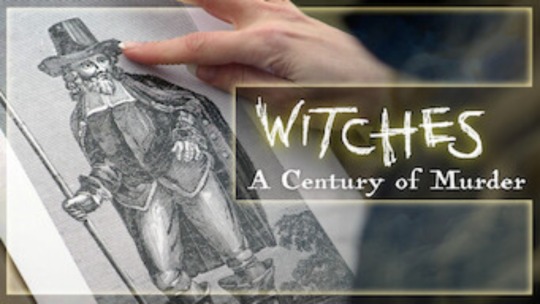
View On WordPress
#DOCUMENTARIES#documentary#english history#history#james VI and I#medieval witch#the tudors#tudor history#witch hunts#Witch hunts in Europe 16th and 17th century#Witches#witches: A Century Of Murder
15 notes
·
View notes
Text
It's one of those morally complex stories that history is full of.
King James VI of Scotland/I of England had two obsessions, 'witches' and Catholics
(His mother was Mary Queen of Scots, grandaughter of Margaret Tudor, sister of Henry VIII who was married to KIng James IV of Scotland. Mary was Catholic and spent many years in France before she became queen on the death of her brother James V.)
(Mary was executed by her cousin Queen Elisabeth I, because English Catholics were plotting to overthrow Elisabeth and replace her with Mary.)
James became convinced that both Catholics and 'witches' were a threat to his kingdom.
Lancashire's Pendle Witch Trial is an infamous example of his witch hunting quest.
His brutal Catholic persecutions lead to what we know as The Gunpowder Plot.
English Catholics had every reason to be angry and scared. Being Catholic was treated as treason, with the cruel and gruesome deaths that this entailed.
But when Robert Catesby and his co-conspirators, including explosives expert Guy Fawkes, decided to do something about it.
What they planned was basically terrorism.
They wouldn't simply blow up The Houses of Parliament, but it would be when King James and his government were in sitting.
Guy Fawkes was captured just as he was setting up the explosives to do their work.
We can heartily decry all the religious persecutions that went on. They were unjust in the extreme.
What King James did to Catholics was as wrong as what the Tudors in their turns had done to both Catholics and Protestants.
But what we celebrate on November 5th is the foiling of a terrorist plot.
There's a valuable lesson here. Terrible injustice mustn't be allowed to go unchallenged.
But by responding with acts of terrorism, aren't we just adding to the injustice, not taking away from it?

Bonfire Night: November 5th.
49 notes
·
View notes
Text






JSTOR Articles on the History of Witchcraft, Witch Trials, and Folk Magic Beliefs
This is a partial of of articles on these subjects that can be found in the JSTOR archives. This is not exhaustive - this is just the portion I've saved for my own studies (I've read and referenced about a third of them so far) and I encourage readers and researchers to do their own digging. I recommend the articles by Ronald Hutton, Owen Davies, Mary Beth Norton, Malcolm Gaskill, Michael D. Bailey, and Willem de Blecourt as a place to start.
If you don't have personal access to JSTOR, you may be able to access the archive through your local library, university, museum, or historical society.
Full text list of titles below the cut:
'Hatcht up in Villanie and Witchcraft': Historical, Fiction, and Fantastical Recuperations of the Witch Child, by Chloe Buckley
'I Would Have Eaten You Too': Werewolf Legends in the Flemish, Dutch and German Area, by Willem de Blecourt
'The Divels Special Instruments': Women and Witchcraft before the Great Witch-hunt, by Karen Jones and Michael Zell
'The Root is Hidden and the Material Uncertain': The Challenges of Prosecuting Witchcraft in Early Modern Venice, by Jonathan Seitz
'Your Wife Will Be Your Biggest Accuser': Reinforcing Codes of Manhood at New England Witch Trials, by Richard Godbeer
A Family Matter: The CAse of a Witch Family in an 18th-Century Volhynian Town, by Kateryna Dysa
A Note on the Survival of Popular Christian Magic, by Peter Rushton
A Note on the Witch-Familiar in Seventeenth Century England, by F.H. Amphlett Micklewright
African Ideas of Witchcraft, by E.G. Parrinder
Aprodisiacs, Charms, and Philtres, by Eleanor Long
Charmers and Charming in England and Wales from the Eighteenth to the Twentieth Century, by Owen Davies
Charming Witches: The 'Old Religion' and the Pendle Trial, by Diane Purkiss
Demonology and Medicine in the Sixteenth and Seventeenth Centuries, by Sona Rosa Burstein
Denver Tries A Witch, by Margaret M. Oyler
Devil's Stones and Midnight Rites: Megaliths, Folklore, and Contemporary Pagan Witchcraft, by Ethan Doyle White
Edmund Jones and the Pwcca'r Trwyn, by Adam N. Coward
Essex County Witchcraft, by Mary Beth Norton
From Sorcery to Witchcraft: Clerical Conceptions of Magic in the Later Middle Ages, by Michael D. Bailey
German Witchcraft, by C. Grant Loomis
Getting of Elves: Healing, Witchcraft and Fairies in the Scottish Witchcraft Trials, by Alaric Hall
Ghost and Witch in the Sixteenth and Seventeenth Centuries, by Gillian Bennett
Ghosts in Mirrors: Reflections of the Self, by Elizabeth Tucker
Healing Charms in Use in England and Wales 1700-1950, by Owen Davies
How Pagan Were Medieval English Peasants?, by Ronald Hutton
Invisible Men: The Historian and the Male Witch, by Lara Apps and Andrew Gow
Johannes Junius: Bamberg's Famous Male Witch, by Lara Apps and Andrew Gow
Knots and Knot Lore, by Cyrus L. Day
Learned Credulity in Gianfrancesco Pico's Strix, by Walter Stephens
Literally Unthinkable: Demonological Descriptions of Male Witches, by Lara Apps and Andrew Gow
Magical Beliefs and Practices in Old Bulgaria, by Louis Petroff
Maleficent Witchcraft in Britian since 1900, by Thomas Waters
Masculinity and Male Witches in Old and New England, 1593-1680, by E.J. Kent
Methodism, the Clergy, and the Popular Belief in Witchcraft and Magic, by Owen Davies
Modern Pagan Festivals: A Study in the Nature of Tradition, by Ronald Hutton
Monstrous Theories: Werewolves and the Abuse of History, by Willem de Blecourt
Neapolitan Witchcraft, by J.B. Andrews and James G. Frazer
New England's Other Witch-Hunt: The Hartford Witch-Hunt of the 1660s and Changing Patterns in Witchcraft Prosecution, by Walter Woodward
Newspapers and the Popular Belief in Witchcraft and Magic in the Modern Period, by Owen Davies
Occult Influence, Free Will, and Medical Authority in the Old Bailey, circa 1860-1910, by Karl Bell
Paganism and Polemic: The Debate over the Origins of Modern Pagan Witchcraft, by Ronald Hutton
Plants, Livestock Losses and Witchcraft Accusations in Tudor and Stuart England, by Sally Hickey
Polychronican: Witchcraft History and Children, interpreting England's Biggest Witch Trial, 1612, by Robert Poole
Publishing for the Masses: Early Modern English Witchcraft Pamphlets, by Carla Suhr
Rethinking with Demons: The Campaign against Superstition in Late Medieval and Early Modern Europe from a Cognitive Perspective, by Andrew Keitt
Seasonal Festivity in Late Medieval England, Some Further Reflections, by Ronald Hutton
Secondary Targets: Male Witches on Trial, by Lara Apps and Andrew Gow
Some Notes on Modern Somerset Witch-Lore, by R.L. Tongue
Some Notes on the History and Practice of Witchcraft in the Eastern Counties, by L.F. Newman
Some Seventeenth-Century Books of Magic, by K.M. Briggs
Stones and Spirits, by Jane P. Davidson and Christopher John Duffin
Superstitions, Magic, and Witchcraft, by Jeffrey R. Watt
The 1850s Prosecution of Gerasim Fedotov for Witchcraft, by Christine D. Worobec
The Catholic Salem: How the Devil Destroyed a Saint's Parish (Mattaincourt, 1627-31), by William Monter
The Celtic Tarot and the Secret Tradition: A Study in Modern Legend Making, by Juliette Wood
The Cult of Seely Wights in Scotland, by Julian Goodare
The Decline of Magic: Challenge and Response in Early Enlightenment England, by Michael Hunter
The Devil-Worshippers at the Prom: Rumor-Panic as Therapeutic Magic, by Bill Ellis
The Devil's Pact: Diabolic Writing and Oral Tradition, by Kimberly Ball
The Discovery of Witches: Matthew Hopkins' Defense of his Witch-hunting Methods, by Sheilagh Ilona O'Brien
The Disenchantment of Magic: Spells, Charms, and Superstition in Early European Witchcraft Literature, by Michael D. Bailey
The Epistemology of Sexual Trauma in Witches' Sabbaths, Satanic Ritual Abuse, and Alien Abduction Narratives, by Joseph Laycock
The European Witchcraft Debate and the Dutch Variant, by Marijke Gijswijt-Hofstra
The Flying Phallus and the Laughing Inquisitor: Penis Theft in the Malleus Maleficarum, by Moira Smith
The Framework for Scottish Witch-Hunting for the 1590s, by Julian Goodare
The Imposture of Witchcraft, by Rossell Hope Robbins
The Last Witch of England, by J.B. Kingsbury
The Late Lancashire Witches: The Girls Next Door, by Meg Pearson
The Malefic Unconscious: Gender, Genre, and History in Early Antebellum Witchcraft Narratives, by Lisa M. Vetere
The Mingling of Fairy and Witch Beliefs in Sixteenth and Seventeenth Century Scotland, by J.A. MacCulloch
The Nightmare Experience, Sleep Paralysis, and Witchcraft Accusations, by Owen Davies
The Pursuit of Reality: Recent Research into the History of Witchcraft, by Malcolm Gaskill
The Reception of Reginald Scot's Discovery of Witchcraft: Witchcraft, Magic, and Radical Religions, by S.F. Davies
The Role of Gender in Accusations of Witchcraft: The Case of Eastern Slovenia, by Mirjam Mencej
The Scottish Witchcraft Act, by Julian Goodare
The Werewolves of Livonia: Lycanthropy and Shape-Changing in Scholarly Texts, 1550-1720, by Stefan Donecker
The Wild Hunter and the Witches' Sabbath, by Ronald Hutton
The Winter Goddess: Percht, Holda, and Related Figures, by Lotta Motz
The Witch's Familiar and the Fairy in Early Modern England and Scotland, by Emma Wilby
The Witches of Canewdon, by Eric Maple
The Witches of Dengie, by Eric Maple
The Witches' Flying and the Spanish Inquisitors, or How to Explain Away the Impossible, by Gustav Henningsen
To Accommodate the Earthly Kingdom to Divine Will: Official and Nonconformist Definitions of Witchcraft in England, by Agustin Mendez
Unwitching: The Social and Magical Practice in Traditional European Communities, by Mirjam Mencej
Urbanization and the Decline of Witchcraft: An Examination of London, by Owen Davies
Weather, Prayer, and Magical Jugs, by Ralph Merrifield
Witchcraft and Evidence in Early Modern England, by Malcolm Gaskill
Witchcraft and Magic in the Elizabethan Drama by H.W. Herrington
Witchcraft and Magic in the Rochford Hundred, by Eric Maple
Witchcraft and Old Women in Early Modern Germany, by Alison Rowlands
Witchcraft and Sexual Knowledge in Early Modern England, by Julia M. Garrett
Witchcraft and Silence in Guillaume Cazaux's 'The Mass of Saint Secaire', by William G. Pooley
Witchcraft and the Early Modern Imagination, by Robin Briggs
Witchcraft and the Western Imagination by Lyndal Roper
Witchcraft Belief and Trals in Early Modern Ireland, by Andrew Sneddon
Witchcraft Deaths, by Mimi Clar
Witchcraft Fears and Psychosocial Factors in Disease, by Edward Bever
Witchcraft for Sale, by T.M. Pearce
Witchcraft in Denmark, by Gustav Henningsen
Witchcraft in Germany, by Taras Lukach
Witchcraft in Kilkenny, by T. Crofton Croker
Witchcraft in Anglo-American Colonies, by Mary Beth Norton
Witchcraft in the Central Balkans I: Characteristics of Witches, by T.P. Vukanovic
Witchcraft in the Central Balkans II: Protection Against Witches, by T.P. Vukanovic
Witchcraft Justice and Human Rights in Africa, Cases from Malawi, by Adam Ashforth
Witchcraft Magic and Spirits on the Border of Pennsylvania and West Virginia, by S.P. Bayard
Witchcraft Persecutions in the Post-Craze Era: The Case of Ann Izzard of Great Paxton, 1808, by Stephen A. Mitchell
Witchcraft Prosecutions and the Decline of Magic, by Edward Bever
Witchcraft, by Ray B. Browne
Witchcraft, Poison, Law, and Atlantic Slavery, by Diana Paton
Witchcraft, Politics, and Memory in Seventeeth-Century England, by Malcolm Gaskill
Witchcraft, Spirit Possession and Heresy, by Lucy Mair
Witchcraft, Women's Honour and Customary Law in Early Modern Wales, by Sally Parkin
Witches and Witchbusters, by Jacqueline Simpson
Witches, Cunning Folk, and Competition in Denmark, by Timothy R. Tangherlini
Witches' Herbs on Trial, by Michael Ostling
#witchcraft#witchblr#history#history of witchcraft#occult#witch trials#research#recommended reading#book recs#jstor
2K notes
·
View notes
Text
Mid Year Book Freak Out 2023
Thanks for tagging me @dauen! I was worried I wouldn't have enough answers this year as I've been more eclectic than usual with my reading, but I do 😅 And apologies for the frequent mention of le Guin, 2023 is the year of Ursula K. le Guin for me!
1. Best book you've read so far...
The Red and the Black by Stendhal
I was surprised when I was swept away by the second half of this book, it not only made me love the second volume but gave me a new appreciation of what Stendhal did in the first volume. I'm still thinking about The Red and the Black months later and it's a strong contender for my favourite book of the year.
However, there were two book I could have mentioned that were new reads for me, but I've gone with this as the other is...
2. Best sequel you've read so far...
The Tombs of Atuan by Ursula K. Le Guin
This did something to my brain, as much as I'm thinking about The Red and the Black, I'm obsessed with The Tombs of Atuan. The atmosphere, le Guin's writing, and Tenar came together to create an almost perfect (for me) story.
3. New release...
Tress of the Emerald Sea by Brandon Sanderson
By default... I've only read Tress so far - I didn't even particularly enjoy Tress 😬
4. Most anticipated release of the second half of the year...
Errm none? I've got no idea what's going on with new releases because I'm trying to clear my blacklist and physical tbr.
5.a. Biggest disappointment...
The Leviathan by Rosie Andrews or Howl's Moving Castle by Diana Wynne Jones
I've separated biggest disappointment and most hated this year because they really do belong in different categories (see 5.b). Both of these would've been great for someone else... I shouldn't have read The Leviathan as a specialist in 17th century, it ended up annoying me with it's blend of history and story. Howl's Moving Castle just isn't my cup of tea, it was a bit too whimsical and it rubbed me up the wrong way.
5.b. Most hated...
Witches: James I and the English Witch-Hunts by Tracy Borman
I've made no secret of how this one pissed me off with it's bad faith portrayal of James I and the witch-hunts in England. I was left seething when reading it, so it deserved it's own spot in a created category.
6. Biggest surprise...
The Poetry of Christina Rossetti
I'm typically not a poetry girl, and when I have read it I've tended to prefer epic and narrative poetry. So when I picked up a collection of Rossetti's poetry I expected to find it tedious... However, I loved exploring her poetry! I now how copies of my favourites in my commonplace book and she's inspired me to try more poetry in the future.
7. Favourite new author (debut or new to you)...
Ursula K. Le Guin
Without a doubt she is a new favourite. I've read so many essays and short stories, watched pretty much every speech she gave that I can, and, of course, been in awe as I've read through the first half of Earthsea.
8. Newest fictional crush/favourite character...
Ged from the Earthsea Cycle
I've spent far too long trying to think of a non-le Guin new favourite character... But it's definitely Ged.
9. A book that made you cry...
None!
10. A book that made you happy...
Emma by Jane Austen
Emma always makes me happy and it's the happiest I've been so far this year.
11. Favourite adaptation...
I haven't watched anything new 😅 I rewatched House of the Dragon which was better the second time around, and Emma 2020 is always a favourite - but I don't think they count.
12. Prettiest cover...
Ivanhoe by Sir Walter Scott
I haven't really bought that many pretty books as I've mainly shopped second hand this year... So, it's probably this vintage copy of Ivanhoe, but we have room for improvement!
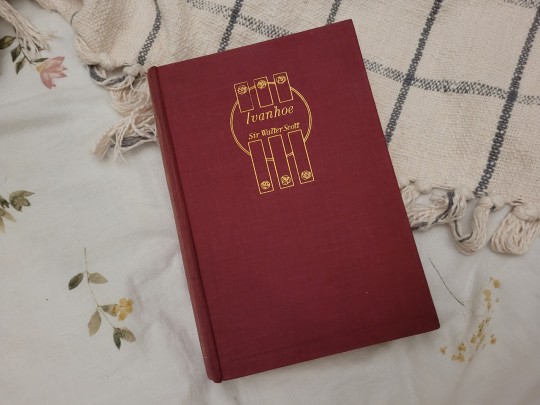
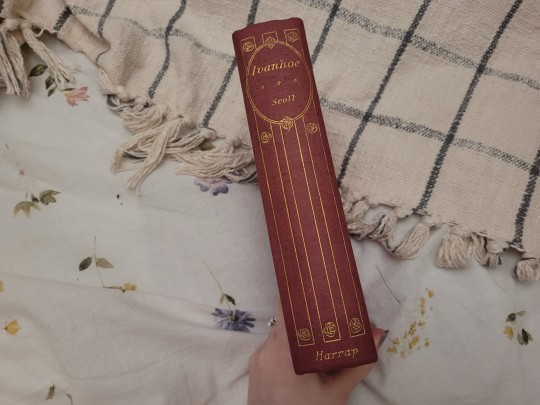
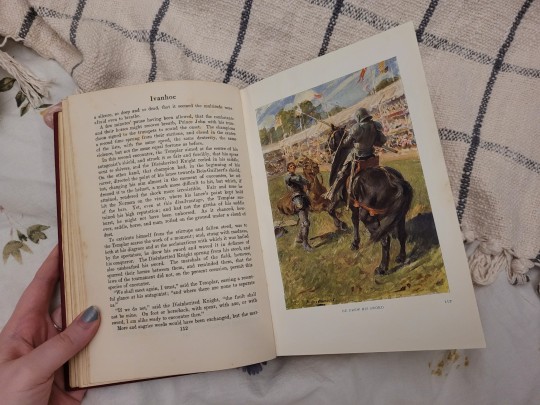
13. A book/books you need before the end of the year...
Oh I have a stack, but some off the top of my head:
A Brightness Long Ago by Guy Gavriel Kay
Fugitive Prince by Janny Wurts
The Charterhouse of Parma by Stendhal (technically I started this, but I got distracted by other French novels... Oops)
Lady Audley's Secret by Mary Elizabeth Bradden
Silas Marner by George Eliot
Tagging: @oneanxiousstudybuddy and @dooareyastudy (I think you haven't been tagged yet but could have missed it, sorry if you have 😅)
#mid year book tag#mid year book freak out tag#books#reading#bookblr#books of 2023#ursula k. le guin#sir walter scott#ivanhoe#I feel like I'm living under a rock this year#I should read some new releases and watch TV!#I won't do either but I recognise that I probably should
4 notes
·
View notes
Text
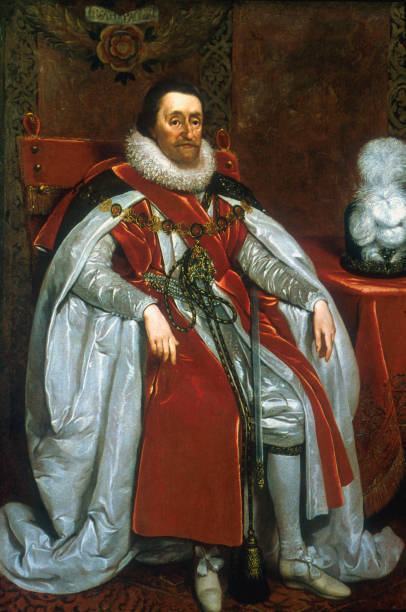
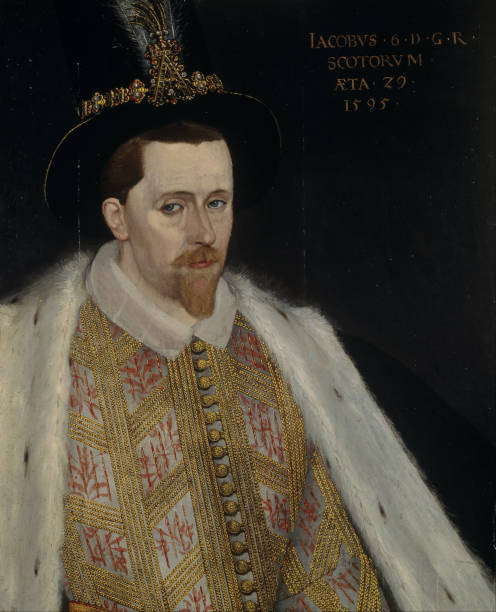
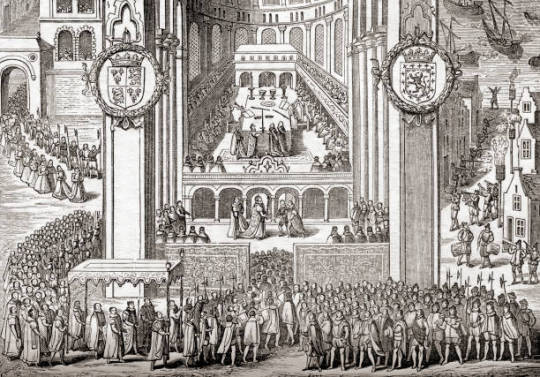

On 3rd April 1603 King James VI travelled to London to take up the English throne, returning to Scotland only once, in 1617.
W hen Elizabeth I died on 24th March 1603, James t had a stronger claim to the English throne than potential other claimants. Elizabeth’s largely protestant privy council immediately wrote to James offering him the crown. He accepted. After settling his affairs in Scotland, James travelled south to London in a grand royal procession. He is thus known to us as James VI and I. James was very keen to promote the idea of union and friendship between the previously hostile England and Scotland. He called it a ‘blessed union’, one of ‘hearts and minds’.
However, an outbreak of plague led to a postponement of James’s royal entry into the city, and curtailed attendance at the coronation at Westminster Abbey on 25th July.
It was mainly James’s Protestantism that appealed to the English. James was a sophisticated and prolific protestant His Daemonology of 1597, advocating the hunting of witches, was promptly reprinted in England upon his accession in 1603, as were his tracts on protestant kingship, The True Lawe of Free Monarchies and Basilikon Doron. Much of the succession literature from 1603 directly addresses James’s Protestantism. But James also had male and female heirs already, which was especially important after nearly half a century of speculation about the succession due to Elizabeth’s childlessness.
As I said earlier James only returned once, despite promising on his departure to return every three years.
In 1617 he professed a ‘salmon-like’ desire to return to the land of his birth, he came with a multitude of English and Scottish courtiers and councillors, and spent around three months touring his castles and palaces, and those of the great lords and lairds. During this period, he presided over a meeting of the Scottish parliament, which famously rejected his attempt to get them to pass his ecclesiastical reforms, which became known as the Five Articles of Perth
James died in 1625 and was succeeded by his son, Charles, his reign ended in his judicial murder in 1649.
First two pics are James, third is a depiction of his coronation in London and fourth is entitled 'The Translators Presenting Bible To James I'
9 notes
·
View notes
Text
So, there's a difference between how a modern American Baptist views magic vs. how a medieval Catholic peasant would vs. a Roman convert. Sure, you have Serious Christian Writers like Tertullian (155 - 220 AD) denouncing pagan Romans for practicing magic and worshipping demons, but on the flip side there are SO MANY Christians buying up magic amulets and writing out curses on tablets in hopes that they can inflict their neighbors with a venereal disease at the same time. Emperor Constantine, the first Roman emperor to convert, continued to worship both Apollo and Jesus at the same time (the "shall not put another god before me" was kind of a hard concept for Romans & Greeks to wrap their heads around in general, considering in Athens they had a temple dedicated to any unknown gods they might not know). As centuries passed, Catholic peasants were still kind of trying to curse each other. That's just how things were. Sure, the local priest might say magic is a sin, but also Judith is about to get married and my fiance died of the plague so fuck Judith I curse her, I curse her to choke on a chicken bone on her wedding day. Medieval Catholic priests and other clergy were just like "whatever, who gives a shit." No one was all that concerned about witches in the middle ages. The Spanish Inquisition? Did not give a fuck about witches. They wanted to catch Muslims, Jews, and heretics. If someone called them up and was like "hey, I think Maria down the street is a witch, there's a pentagram painted on her floor" they'd be like "Wtf? What is this peasant bullshit? The Inquisition is serious business. I don't care if Maria has a pentagram painted on her floor unless there's a menorah in the center of it." If the Catholic Church convicted you on witchcraft, it was probably just a trumped up charge that they tacked on at the end to make you sound much more impressive when they lit you up like a firecracker. Like Joan of Arc! Her real crime was wearing men's clothes (and also kicking English ass, but they couldn't write that in official court documents), but the powers that be decided to throw in witchcraft too. For some extra spice, not that they really believed she was a witch.
Christianity didn't start taking magic seriously until the Protestant Reformation. That's when everyone became super paranoid about witches and started hunting them down (this was also when the Statute of Secrecy was enacted). Why is this? Well, maybe because for the first time, Christians actually knew what the Bible said. Before King James I translated the Bible into English, it was only written in Latin. Church services? All in Latin. And most people could not read or speak the language. All they knew about their religion was based on word-of-mouth and the miracle plays they watched a couple of times a year. They probably had no idea that there was even a line in the Bible that said "Thou shalt not suffer a witch to live." Before then magic was accepted as a thing that existed, that could be used for good or ill, and that weird old lady down the street might be a witch, but magic is useful. She cured your lame horse last winter. And maybe she'll even curse Judith for you (that bitch).
All this to say, that I think British wizards and witches converted to Christianity at the same time as the Muggle population. There was no reason not to. The vast majority probably couldn't read Latin either, they only Latin they knew were Roman spells they had picked up, or they used their own spells based in the Brythonic and Anglo-Saxon languages. Those that could read the Bible probably rationalised that "no magic" line as meaning "thou shalt not suffer a Dark witch to live." Because people are very, very good at rationalising and absolving themselves of any perceived sin. And it wasn't like there were any consequences. No one was going to do a thing about them practicing magic, no one cared (unless they wanted to buy their services).
question to the void: what watsonian explanation is there for wizards celebrating christmas?
201 notes
·
View notes